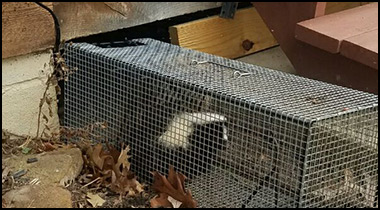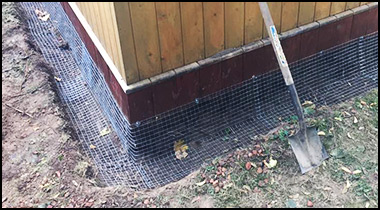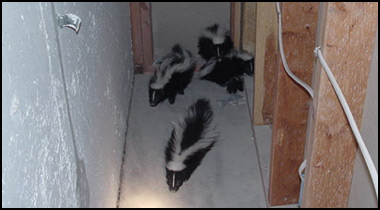Phoenix Skunk Removal Resources
Skunk Rehabber - Liberty Wildlife Rehabilitation Foundation: 480-998-5550
Free Maricopa County Animal Services: 602-506-7387
Humane Wildlife Trappers of Phoenix: 602-313-8971
If you need skunk control in Phoenix, you have a few options. First, you can attempt to solve the skunk problem yourself by reading our do-it-yourself guide. If you need outside help, you can also call Maricopa County Animal Services to see if they have any free resources or help for you - however, they primarily deal with dog and cat concerns. You can also call a local Phoenix wildlife rehabber, as they are typically a great resource for advice that is in the best welfare of the animal. If as a last resort you must hire a professional company, we recommend Humane Wildlife Trappers of Phoenix at 602-313-8971. To learn more about them or check their skunk removal prices, visit phoenixpestanimal.com.

Phoenix Skunk Trapping and Removal

Preventative Repairs & Exclusion

Phoenix Skunk Removal From Structures
In many cases, preventative measures can solve your Phoenix skunk problem - keep garbage secured, pet food indoors, and most of all when it comes to skunks, secure the perimeter of your shed, porch, deck, or house with a barrier - lattice or steel mesh is good, and it keeps Arizona skunks from going under the structure. If trapping and removal of the skunk is the only option you have, please do so with the help of a local agency or professional company who knows how to do it humanely and legally. Browse the resources of this site for more educational information.
Frequently Asked Questions:
Prevention: How to Keep Skunks Away
What to do with a skunk after I catch it?
Is it legal for me to trap a skunk?
How to remove skunk odor
Is a skunk active during the daytime rabid?
What does skunk feces look like?
Phoenix Skunk Control Information: Babies and momma skunks
A key factor in the animal kingdom is reproduction. From a humming bird to an elephant. In order for the circle of life to continue, they must procreate. This does not exclude skunks. That's right, those odiferous little critters have families too.
Skunks are more common in north America than they are anywhere else in the world. They can mate several times during the year, but typically only breed in the spring. A female skunk will produce a litter of kits every year, almost like clockwork.
Unlike the gestational time of an elephant, skunks only have a gestation period of two months. Once the two months are up, they can have up to ten babies-also known as kits-at a time.
Skunks look for holes or dens to spend months at a time in. They need a dark and place where they feel safe to have their litters. When the kits are born they are extremely vulnerable, so the mother needs to find a place where she feels it is safe. At first, the kits are blind and they have to rely solely on their mothers to protect and care for them. In order to do this, they will go to a place that is less likely to have much action.
A lot of times they are only looking for a place to have their litters. They are opportunists, like most animals in the wild. If they can find a place to live without doing extra work for it, they will most certainly capitalize on it. After all, why work any harder than you have too?
The key places for skunks to have their litters are places that are dry, dark and realistically quiet. Skunks are nocturnal so then need dark places in order to function properly. Places like under a porch, shed or barn make perfect places for them. They are easily accessible and relatively quiet and they also provide substantial shelter from the elements.
Momma skunks are some of the most nurturing animals in the animal kingdom. If you have a skunk living in these places-especially from May-September-it is safe to assume there is a momma and a litter. Skunks only remain with their mothers for roughly a year.
These animals aren't out to hurt you or your animals. They are simply looking for a safe place to hide and have their babies
Remember, for free services you can try 480-998-5550 or 602-506-7387, but if you need to pay for professional help, check the prices at the phoenixpestanimal.com website. Or follow our do-it-yourself guide!

